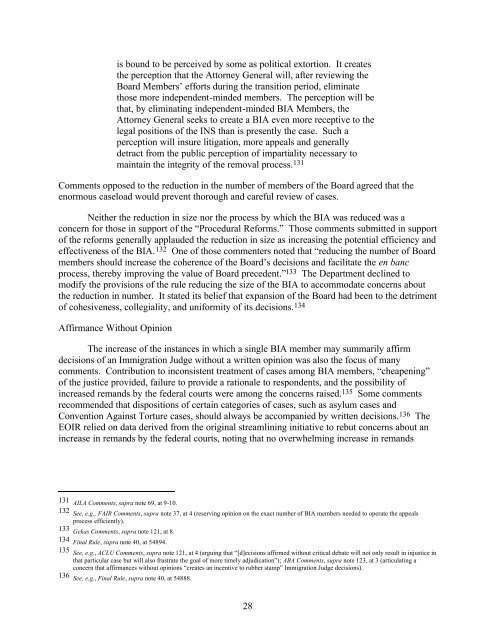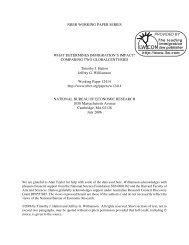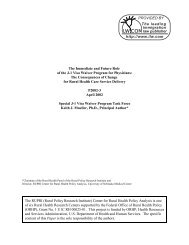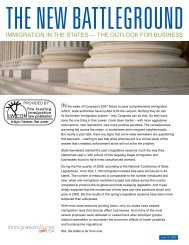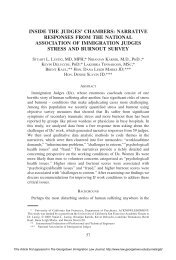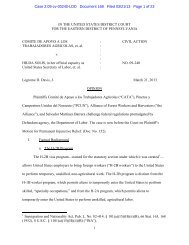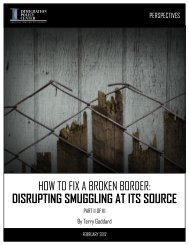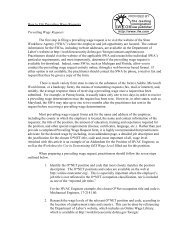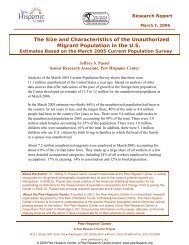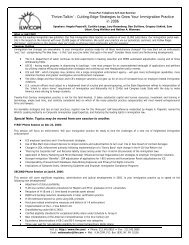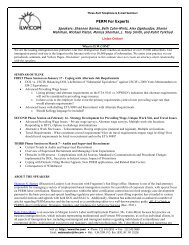Study of Board of Immigration Appeals Procedural Reforms - ILW.com
Study of Board of Immigration Appeals Procedural Reforms - ILW.com
Study of Board of Immigration Appeals Procedural Reforms - ILW.com
You also want an ePaper? Increase the reach of your titles
YUMPU automatically turns print PDFs into web optimized ePapers that Google loves.
is bound to be perceived by some as political extortion. It creates<br />
the perception that the Attorney General will, after reviewing the<br />
<strong>Board</strong> Members’ efforts during the transition period, eliminate<br />
those more independent-minded members. The perception will be<br />
that, by eliminating independent-minded BIA Members, the<br />
Attorney General seeks to create a BIA even more receptive to the<br />
legal positions <strong>of</strong> the INS than is presently the case. Such a<br />
perception will insure litigation, more appeals and generally<br />
detract from the public perception <strong>of</strong> impartiality necessary to<br />
maintain the integrity <strong>of</strong> the removal process. 131<br />
Comments opposed to the reduction in the number <strong>of</strong> members <strong>of</strong> the <strong>Board</strong> agreed that the<br />
enormous caseload would prevent thorough and careful review <strong>of</strong> cases.<br />
Neither the reduction in size nor the process by which the BIA was reduced was a<br />
concern for those in support <strong>of</strong> the “<strong>Procedural</strong> <strong>Reforms</strong>.” Those <strong>com</strong>ments submitted in support<br />
<strong>of</strong> the reforms generally applauded the reduction in size as increasing the potential efficiency and<br />
effectiveness <strong>of</strong> the BIA. 132 One <strong>of</strong> those <strong>com</strong>menters noted that “reducing the number <strong>of</strong> <strong>Board</strong><br />
members should increase the coherence <strong>of</strong> the <strong>Board</strong>’s decisions and facilitate the en banc<br />
process, thereby improving the value <strong>of</strong> <strong>Board</strong> precedent.” 133 The Department declined to<br />
modify the provisions <strong>of</strong> the rule reducing the size <strong>of</strong> the BIA to ac<strong>com</strong>modate concerns about<br />
the reduction in number. It stated its belief that expansion <strong>of</strong> the <strong>Board</strong> had been to the detriment<br />
<strong>of</strong> cohesiveness, collegiality, and uniformity <strong>of</strong> its decisions. 134<br />
Affirmance Without Opinion<br />
The increase <strong>of</strong> the instances in which a single BIA member may summarily affirm<br />
decisions <strong>of</strong> an <strong>Immigration</strong> Judge without a written opinion was also the focus <strong>of</strong> many<br />
<strong>com</strong>ments. Contribution to inconsistent treatment <strong>of</strong> cases among BIA members, “cheapening”<br />
<strong>of</strong> the justice provided, failure to provide a rationale to respondents, and the possibility <strong>of</strong><br />
increased remands by the federal courts were among the concerns raised. 135 Some <strong>com</strong>ments<br />
re<strong>com</strong>mended that dispositions <strong>of</strong> certain categories <strong>of</strong> cases, such as asylum cases and<br />
Convention Against Torture cases, should always be ac<strong>com</strong>panied by written decisions. 136 The<br />
EOIR relied on data derived from the original streamlining initiative to rebut concerns about an<br />
increase in remands by the federal courts, noting that no overwhelming increase in remands<br />
131 AILA Comments, supra note 69, at 9-10.<br />
132 See, e.g., FAIR Comments, supra note 37, at 4 (reserving opinion on the exact number <strong>of</strong> BIA members needed to operate the appeals<br />
process efficiently).<br />
133 Gekas Comments, supra note 121, at 8.<br />
134 Final Rule, supra note 40, at 54894.<br />
135 See, e.g., ACLU Comments, supra note 121, at 4 (arguing that “[d]ecisions affirmed without critical debate will not only result in injustice in<br />
that particular case but will also frustrate the goal <strong>of</strong> more timely adjudication”); ABA Comments, supra note 123, at 3 (articulating a<br />
concern that affirmances without opinions “creates an incentive to rubber stamp” <strong>Immigration</strong> Judge decisions).<br />
136 See, e.g., Final Rule, supra note 40, at 54888.<br />
28


